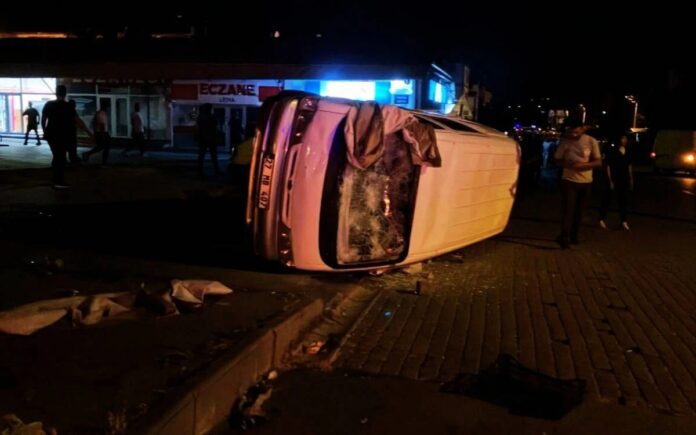Ecehan Balta
On the evening of June 30, 2024, the town of Kayseri, in central Anatolia, turned into a battlefield following allegations that a Syrian refugee sexually assaulted a five-year-old child. Homes, businesses, and cars belonging to Syrians were set on fire and destroyed by a lynch mob. Despite calls for calm from the ruling AKP party, the violence spread to other cities like Konya, Antalya, Hatay, Gaziantep, and Istanbul. On July 3, a 17-year-old Syrian boy was stabbed to death by three individuals aged 15-17 in Antalya. So far, nearly 500 people have been detained due to the attacks on Syrians. In response, attacks targeted Turkish trucks, military bases, governor’s offices, service institutions, and Turkish flags in places like Afrin, Idlib, Azaz, Jarabulus, al-Rai, and Marea in Syria. While the street violence has subsided in the past two days, tensions remain high.
Political Games
Since the Syrian Civil War began in 2011, official figures indicate that 4.6 million Syrians have sought refuge in Turkey. These individuals are classified under a special law as “Syrians under Temporary Protection (SuTP)” and can live and work in designated cities with annual permit renewals. However, due to Turkey’s fluctuating policies on Syrians, it is often argued that the actual number far exceeds 4.6 million, including undocumented Syrians. For instance, Istanbul Mayor Ekrem İmamoğlu claims there are 2.5 million refugees in Istanbul alone.
The absence of any housing, social protection, or economic integration programs for refugees, who now constitute nearly 10% of Turkey’s population, has led to severe tension and anger among both refugees and non-refugee communities. The 2016 EU-Turkey summit, which ended Turkey’s role as a transit country, further complicates the situation. Europe expects Turkey to act as a guardian, keeping asylum seekers both inside and outside its borders.
Domestically, the main opposition party CHP, which ostensibly holds a more center-leftstance, pursues a policy summarized as “sending refugees home with dignity” and blames the ruling AKP’s open-door policy for the “refugee problem.” The AKP government, on the other hand, claims that the “vandalism” that started in Kayseri and spread to other cities is fueled by the CHP opposition’s irresponsible and provocative stance.
According to a statement by the Minister of Justice, “following the events, approximately 343,000 posts were made from around 79,000 accounts on the social media platform X. It was determined that 37% of the accounts were bots and 68% of the posts were provocative and negative.” Based on this data, it can be argued that the spread of the lynch attempt in Kayseri was deliberately orchestrated. However, it is clear that the AKP does not benefit from such tensions. The AKP faces a complex web of issues, including whether to withdraw from Syria or not, protecting both Russian and US interests, and dealing with the possibility of Salafist-jihadists fleeing if it hands over the territory it currently controls in cities like Afrin, al-Bab, Azaz, Jarabulus, Cinderes, Rajo, Tel Abyad, and Ras al-Ayn to the Assad regime. Similarly, the CHP, which emerged as the leading party for the first time in 41 years in the local elections, would not prefer escalating tensions within the country. Therefore, there is insufficient data and clear reasons to predict who initiated the pogrom attempt.
Tensions Rising
On the other hand, it is evident that there is a crowd that can be manipulated, and as the economic crisis deepens, the impoverished layers of society put the blame on Syrians who are forced to work cheaply, insecurely, and illegally. In this scenario, refugees serve as an airbag for the AKP government against the accumulating anger due to the economic crisis. Meanwhile, the middle-class, secularist, white Turks often approach the issue with widespread Arab-Muslim hatred (with the CHP trying to secure the votes of these layers).
It is also worth discussing the extent of the involvement of the ultra-nationalist MHP, an AKP coalition partner, in this pogrom. We have witnessed many MHP supporters in the streets against Syrian refugees making the Grey Wolves hand sign that became famous after the Turkey- Austria football match of the European Cup. These events are unfolding just days before the trial on the killing of Sinan Ateş, the former president of Ülkü Ocakları, an organization directly linked to MHP. Ateş was killed in broad daylight in Ankara by Ülkü Ocakları members 17 months ago, in an internal bloody settling of accounts. It should also be added that MHP has previously issued these kinds of threatening messages during internal tensions with the ruling AKP, their coalition partner.
Wherever these attacks come from, it is certainly incorrect to assume that refugees can quickly return to post-war Syria. In a country where the war economy persists, and reconstruction remains out of sight due to sanctions, it is impossible to speak of a level of normalization where people can live comfortably, and children can attend school. Furthermore, is it right to demand the return of those who were born and raised in the country where their families sought refuge or those who have established a life in Turkey? We think not, except if they want to.
The refugee issue taking center stage in Turkey and recently turning into an attempted pogrom is closely related to the state’s border and migration policies. We should fight so no more people will die because of a policy that upholds a race-based approach, feeding racism, and treating even the children of Syrian refugees born here as “guests,” limiting their opportunities for a humane life.
We will fight to stop hate attacks fueled by the state’s border and migration policies and racist motives. Those who incite and carry out these attacks need to be urgently identified, arrested, and punished severely. To prevent new attacks, left political parties and movements need to stand together and present a strong stance. The capitalist system pits refugee and non-refugee communities against each other. So, for a world without borders, classes, and exploitation, let’s continue the struggle!













